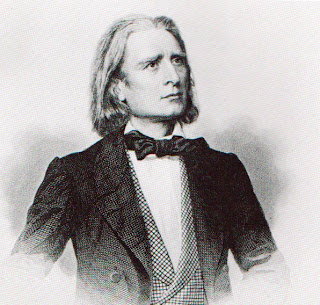I'm revisiting the reclaimed record pile this week, with the first three issued recordings by the First Piano Quartet (Vladimir Padwa, Frank Mittler, Adam Garner, Edward Edson). Initially all three were issued in Victor's "Double Feature" series, a semi-classical line priced 25 cents lower than the Red Seal series. The 1948 RCA Victor Catalog describes these as having teal labels; however, as can be clearly seen, my copy of one of them has an ordinary black label. My guess is that they replaced the teal labels with black ones as being cheaper to produce. In any event, all three issues were subsequently upgraded to Red Seal status a year later, the form in which I have the other two (in somewhat battered copies, I'm afraid):
Chopin: Polonaise in A-Flat, Op. 53
RCA Victor 46-0005, one 78-rpm record
Paganini: Variations in A minor (composed by the ensemble's members)
Chopin: Etudes, Op. 25, Nos. 6, 1 and 9
RCA Victor 12-0250, one 78-rpm record
Liszt: Second Hungarian Rhapsody
RCA Victor 12-0251, one 78-rpm record
The First Piano Quartet
Recorded c. early 1947
Link (FLAC files, 57.89 MB)
Link (MP3 files, 41.69 MB)
The Paganini Variations were the group's radio theme signature, according to the label, which also bears the cryptic composer credit "Paganini-Garner-Edson-Mittler-Padwa" - it is of course the same theme that also inspired Brahms, Rachmaninoff, Lutoslawski and so many others for variations.
Showing posts with label Chopin. Show all posts
Showing posts with label Chopin. Show all posts
Friday, May 22, 2015
Sunday, February 9, 2014
Chopin: Rondo, Op. 73 (Bartlett and Robertson)
Of the 32 issued sides recorded for American Columbia by duo-pianists Ethel Bartlett and Rae Robertson between 1940 and 1945, the two comprising this disc may well be the rarest, for they are the only two such sides by the duo not listed in the 1949 Columbia Catalog, nor does there appear to have been any other issue of them. The piece thus honored, if you can call it that, is this charming Rondo by Chopin, one of five free-standing works he was to write in this form, and his only work for two pianos to be graced with an opus number (posthumously given, as it is early, dating from 1828):
Chopin: Rondo in C Major for Two Pianos, Op. 73
Ethel Bartlett and Rae Robertson, pianos
Recorded January 29, 1941
Columbia 71190-D, one 78-rpm record
Link (FLAC file, 17.72 MB)
Link (MP3 file, 13.62 MB)
Chopin: Rondo in C Major for Two Pianos, Op. 73
Ethel Bartlett and Rae Robertson, pianos
Recorded January 29, 1941
Columbia 71190-D, one 78-rpm record
Link (FLAC file, 17.72 MB)
Link (MP3 file, 13.62 MB)
Friday, October 21, 2011
Happy Birthday, Franz Liszt!
Tomorrow is the 200th anniversary of the birth of Franz Liszt (born October 22, 1811), and, to celebrate, I'm taking a little break from my reissue postings to offer something kinda fun. I must say at the outset that I cannot count myself a Liszt fan, although I do recognize his pre-eminent position as a pianist (and oh, if only he had lived a few years longer, he could have left us a recording of his playing!). But as a composer, it seems to me that he took himself too seriously about 90% of the time. Of course, most of the Romantics did this, but in Liszt's case, it usually backfired. I suspect his essential temperament was a fun-loving one - no doubt, he had fun playing the piano! - and the works of Liszt that I usually enjoy hearing are those that exhibit this, such as the Hungarian Rhapsodies and the Mephisto Waltz. I also enjoy hearing Liszt in "fun" arrangements, such as the one I offer here:
Liszt: Liebestraum No. 3 in A-Flat
and
Chopin: Nocturne in E-Flat, Op. 9, No. 2
J. H. Squire Celeste Octet
Recorded January 29, 1932
Columbia DX 362, one 78-rpm record
Link (FLAC files, 22.43 MB)
Link (MP3 files, 9.24 MB)
Perhaps J. H. Squire (1880-1956) didn't intend these salon orchestra arrangements, played by an ensemble consisting of strings, piano, harmonium and, yes, celesta, to be fun, but that's how they come across nearly a century later. Notice how the two cadenzas in the "Liebestraum" are played by the pianist in the group, as if in acknowledgement of their essential un-transcribability!
A number of Edison Blue Amberol cylinders played by the Moss-Squire Celeste Orchestra, which I presume was a precursor to the Squire Celeste Octet, can be heard online at the USCB's Cylinder Digitization Project. These are fun, too.
Liszt: Liebestraum No. 3 in A-Flat
and
Chopin: Nocturne in E-Flat, Op. 9, No. 2
J. H. Squire Celeste Octet
Recorded January 29, 1932
Columbia DX 362, one 78-rpm record
Link (FLAC files, 22.43 MB)
Link (MP3 files, 9.24 MB)
Perhaps J. H. Squire (1880-1956) didn't intend these salon orchestra arrangements, played by an ensemble consisting of strings, piano, harmonium and, yes, celesta, to be fun, but that's how they come across nearly a century later. Notice how the two cadenzas in the "Liebestraum" are played by the pianist in the group, as if in acknowledgement of their essential un-transcribability!
A number of Edison Blue Amberol cylinders played by the Moss-Squire Celeste Orchestra, which I presume was a precursor to the Squire Celeste Octet, can be heard online at the USCB's Cylinder Digitization Project. These are fun, too.
Subscribe to:
Posts (Atom)


